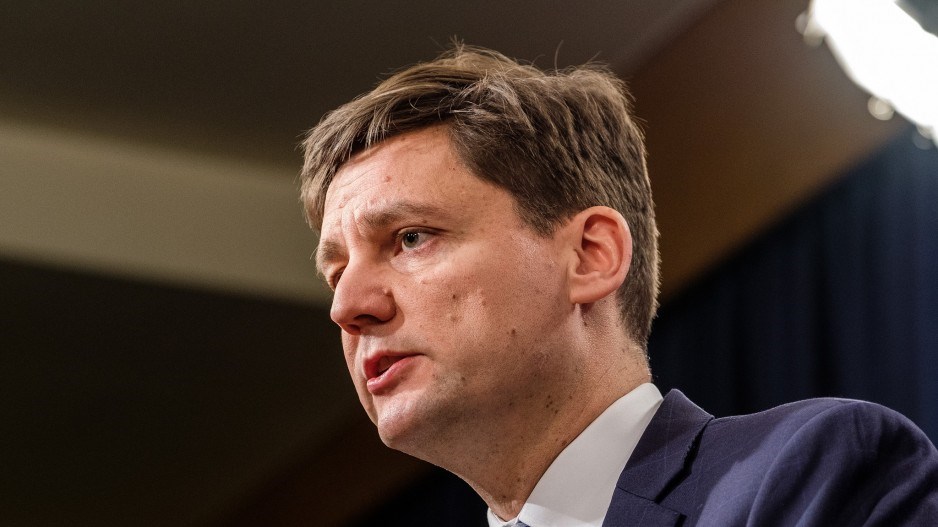Premier David Eby has reached the half-way point of his 100-day launch plan, and while he’s racked up an impressive list of accomplishments so far, he’s also a long way away from hitting the high bar he set for himself at the start.
Eby surpassed 50 days as B.C.’s 37th premier this weekend. He’s expected to speak about his accomplishments on Monday and throughout the week.
No one can accuse Eby of resting on his laurels. He has, instead, presided over the largest and most ambitious shift in government policy since the BC NDP first took office in 2017.
Among the changes: New BC Hydro and affordability credits (which began landing in bank accounts last Thursday), a public safety and prolific offenders plan, the elimination of rental restrictions in stratas, new housing rules for municipalities, new funding for the RCMP, a reversal of unpopular autism changes for children, a boost to foreign-trained doctors, a new medical school, a freeze on ICBC insurance rates, new funding for the residential tenancy branch and an announcement Monday on new resources for overworked nurses.
Along the way, Eby installed a new cabinet, launched B.C.’s first dedicated Ministry of Housing, and reset the leadership of the civil service.
All that, in roughly 50 days – including two weeks off for Christmas holidays.
It’s a boastworthy list. Eby is expected to round it out this month with extra funding for First Nations land management, and a more ambitious plan to protect additional old-growth forests.
But the size of the list of his accomplishments is, in many ways, irrelevant.
That’s because Eby set his own clear markers for how the public should judge his performance – visible, tangible improvements on key files like housing, health care, the environment, homelessness and public safety.
Those changes, he said, will start during his 100-day plan and carry through to next year’s scheduled provincial election.
“At the end of those 100 days, you will have seen announcements, activity from government, focused on delivering results for British Columbians, that set out the groundwork for how, in the next two years, we are going to deliver significant change for British Columbians,” Eby said when he first unveiled the plan on Oct. 21.
“What I want our team to deliver over the next 18 months to two years for British Columbians are real, concrete things that they can see, that they can touch, that show them the direction that we're going,” Eby added at his swearing-in on Nov. 18.
“The big indicator that we are headed in the right direction is when British Columbians look at their downtowns, and when they travel into town to do some shopping or whatever, that they feel safer in their communities,” Eby said at his public safety announcement on Nov. 20.
Measured in those ways, the premier’s progress is less impressive.
Crime, vandalism and tent encampments have changed little, if at all, especially in Vancouver’s Downtown Eastside.
Affordability continues to get worse, as new provincial aid falls short of meeting the pressures of rising inflation and interest rates.
The overdose crisis continues, unabated. Housing and rent is still wildly unaffordable for many.
And health care remains on emergency footing due to COVID-19 and the flu, exacerbated by overwhelmed emergency rooms and a national shortage of cold medication for children.
You’d be hard-pressed to point to visible real-world progress in any of those areas, half-way into the 100-day plan. It’s unlikely to get much better by the full 100-day mark, on Feb. 26.
You might think there’s a political risk to a premier promising meaningful change within a specific timeline, and then failing to deliver.
But the masterful thing about Eby’s plan is that it ends just two days before the Feb. 28 provincial budget. There won’t be much interest in stopping to analyze the real-world impact (or lack thereof) from an old plan when the premier has already pivoted into announcing billions of dollars of shiny and exciting new things in a fresh budget.
Viewed that way, the 100-day plan is kind of pointless. It’s an impressive series of political announcements that at the half-way point has yet to coalesce into much real-world change. Until that happens, despite the long list of accomplishments, it remains mostly meaningless for ordinary British Columbians.
Rob Shaw has spent more than 14 years covering B.C. politics, now reporting for CHEK News and writing for Glacier Media. He is the co-author of the national bestselling book A Matter of Confidence, and a regular guest on CBC Radio.



